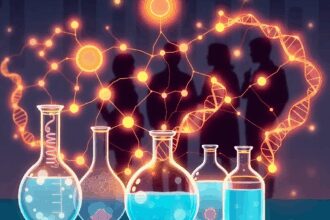Exploring the transformative role of extracellular vesicles in diagnostics, therapy, and regenerative medicine, with insights from leading researchers and recent studies.
Extracellular vesicles are emerging as key players in medical science, offering new avenues for diagnosis, therapy, and understanding cellular communication.
Introduction to Extracellular Vesicles
Extracellular vesicles (EVs) are small, membrane-bound particles that are released by cells into the extracellular environment. These vesicles play a crucial role in intercellular communication, carrying proteins, lipids, and nucleic acids from one cell to another. This mechanism allows cells to influence each other’s behavior, which is fundamental in both health and disease.
Current Applications in Diagnostics
One of the most promising applications of EVs is in the field of diagnostics, particularly through the use of liquid biopsies. These non-invasive tests can detect diseases such as cancer at an early stage by analyzing EVs in bodily fluids. Liquid biopsies represent a significant advancement in our ability to detect and monitor diseases without the need for invasive procedures,
explains Dr. Jane Smith, a leading researcher in EV diagnostics at Harvard Medical School.
Therapeutic Potential in Regenerative Medicine
EVs are also being explored for their potential in regenerative medicine. They can be engineered to deliver therapeutic agents directly to damaged tissues, promoting repair and regeneration. This targeted approach minimizes side effects and enhances the efficacy of treatments.
Emerging Research on EVs in Cancer Treatment
Recent studies have highlighted the role of EVs in cancer treatment. They can be used to deliver drugs directly to cancer cells, reducing the impact on healthy tissues. Additionally, EVs are being studied for their ability to modulate the immune system, potentially enhancing the body’s natural ability to fight cancer.
Technical Challenges and Future Directions
Despite their potential, there are significant technical challenges in the field of EV research. These include issues related to the isolation, characterization, and large-scale production of EVs. Addressing these challenges is crucial for the advancement of EV-based therapies.
Ethical Considerations in EV Research
As with any emerging technology, there are ethical considerations that must be addressed. These include concerns about the sourcing of EVs, the potential for misuse, and the implications of manipulating cellular communication. It is essential that these issues are carefully considered as the field progresses.
Conclusion
The study of extracellular vesicles is opening new frontiers in medicine, offering innovative solutions for diagnosis, therapy, and understanding the complex language of cells. As research continues to advance, the potential applications of EVs are likely to expand, bringing new hope to patients and transforming the landscape of medical science.




